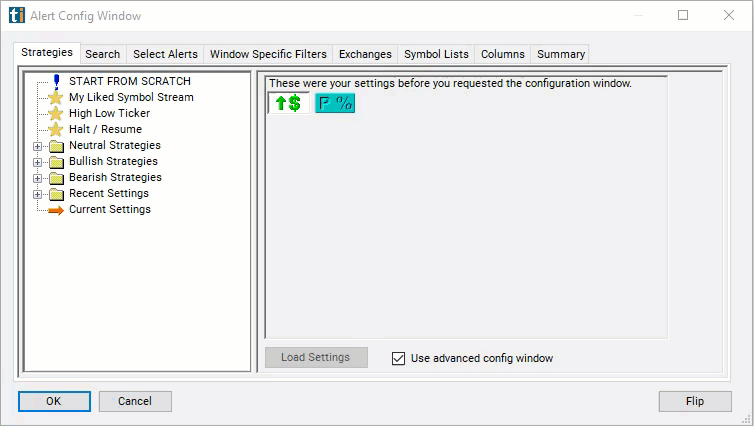Change in 5 Days
Table of Contents
- Understanding the Change in 5 Days Dollar Filter
- Change in 5 Days Dollar Filter Settings
- Using the Change in 5 Days Dollar Filter
- FAQs
Understanding the Change in 5 Days Dollar Filter
The "change in 5 days" filter compares the current price to the price 5 days ago, measured in dollars. These are trading days, not calendar days. So this filter looks at changes in the last week.
The formula for the $ versions is simply the current price minus the old price. Bigger numbers mean that the price has moved up more. Negative numbers mean that the price has moved down. 0 means no change.
The current price is based on the last print. There is no smoothing or averaging. This updates before, during, and after market hours.
The old price is always based on the close. If you are look at the Up in 5 Days filter, then you are comparing the current price to the close 6 days ago. If you are looking at this filter at the open, then you will see the price change for exactly 5 days. If you are looking at this filter one hour after the open, then you will see the change for 5 days and one hour. At lunch time you will see the change for 5½ days. At the close you will see the change for 6 days.

Change in 5 Days Dollar Filter Settings
The settings of each Trade Ideas filter are defined in the Window Specific Filters Tab located in the Configuration Window of your Alert/Top List Window.
Here is how to setup the filter in your configuration window:
- Set the min value to 5 to see stocks which are up at least $5 from 5 days ago.

Using the Change in 5 Days Dollar Filter
Several trading strategies can be employed with the Change in 5 Days Dollar filter. Here are a few examples:
Trend Following: Traders aim to capitalize on the continuation of existing price trends. If the change in the stock's price over the past five days indicates a consistent upward or downward trend, traders may consider entering positions in the direction of the trend. For example, if the stock has experienced a significant positive change over the five-day period, it may signal an uptrend, prompting traders to enter long positions. Conversely, if there's a significant negative change, it may indicate a downtrend, leading traders to consider short positions.
Reversal Trading: Traders aim to identify potential reversal points in the price movement. If the change in the stock's price over the past five days suggests that the price has moved significantly in one direction and may be nearing exhaustion, traders may look for signs of a reversal. For example, if the stock has experienced a strong uptrend over the past five days and the change is showing signs of slowing down or reversing, traders may anticipate a potential reversal and adjust their positions accordingly.
Volatility Trading: Traders aim to profit from short-term price fluctuations and increased volatility. If the change in the stock's price over the past five days indicates increased volatility, traders may look for opportunities to enter short-term trades to capitalize on price movements. They may employ strategies such as scalping or day trading to take advantage of short-term price fluctuations.
FAQs
What does "change in 5 days ($)" mean?
- "Change in 5 days ($)" refers to the difference in the stock's price between the current trading day and the closing price five trading days ago, measured in dollars. It indicates how much the stock's price has changed over the five-day period.
Why is the "change in 5 days ($)" filter important in trading?
- The "change in 5 days ($)" filter provides traders with insights into the short-term price movement of a stock over a specific timeframe. It helps traders identify trends, reversals, or changes in volatility, which can inform trading decisions.
How is the "change in 5 days ($)" calculated?
- The calculation involves subtracting the stock's closing price from five trading days ago from the current price to determine the difference in price over the five-day period.
Filter Info for Change in 5 Days [U5DD]
- description = Change in 5 Days
- keywords = Single Print
- units = $
- format = p
- toplistable = 1
- parent_code =






 Change in 5 Days [U5DP]
Change in 5 Days [U5DP] Change in 10 Days [U10DD]
Change in 10 Days [U10DD] Change in 10 Days [U10DP]
Change in 10 Days [U10DP] Change in 20 Days [U20DD]
Change in 20 Days [U20DD] Change in 20 Days [U20DP]
Change in 20 Days [U20DP]